情态动词的用法归纳.doc
- 格式:doc
- 大小:384.54 KB
- 文档页数:6
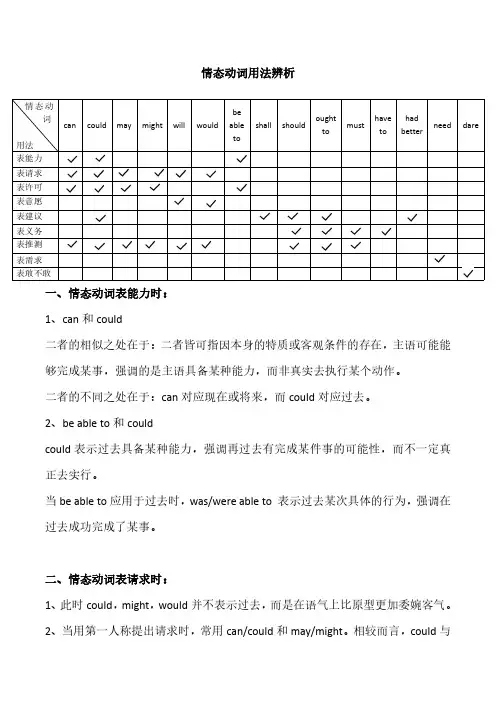
情态动词用法辨析情态动词用法can could may might will would be able to shall should ought to must have to had better need dare表能力表请求表许可表意愿表建议表义务表推测表需求表敢不敢一、情态动词表能力时:1、can 和could二者的相似之处在于:二者皆可指因本身的特质或客观条件的存在,主语可能能够完成某事,强调的是主语具备某种能力,而非真实去执行某个动作。
二者的不同之处在于:can 对应现在或将来,而could 对应过去。
2、be able to 和couldcould 表示过去具备某种能力,强调再过去有完成某件事的可能性,而不一定真正去实行。
当be able to 应用于过去时,was/were able to 表示过去某次具体的行为,强调在过去成功完成了某事。
二、情态动词表请求时:1、此时could ,might ,would 并不表示过去,而是在语气上比原型更加委婉客气。
2、当用第一人称提出请求时,常用can/could 和may/might 。
相较而言,could 与may在表请求的问句中出现的频率最高;might表发请求的语气最为委婉客气,因此反而很少见;而can则常用于熟人间的对话中。
语气强度:can>could/might>might3、当用第二人称提出请求时,常用can/could和will/would。
其中could和would 表达请求的语气更委婉客气;而can与will则常用于熟人对话中。
语气强度:can/will>could/would三、情态动词表许可时:1、与表请求不同,will/would不论前接第几人称,都表示主语本身的意愿,无需得到他人的“许可”,所以will/would不可以用于表请求的句中。
2、can和may二者都可以表示对现在或将来动作的许可,其中can的使用频率更高。

情态动词用法归纳情态动词有can (could), may (might), must, have to, shall (should, will (would), dare (dared), need (needed), ought to等。
情态动词无人称和数的变化;不能单独使用,必须与其后的动词原形构成谓语一、can, could1) 表示能力(体力、知识、技能)。
Can you lift this heavy box?(体力)Mary can speak three languages.(知识)Can you skate?(技能)此时可用be able to代替。
Can只有一般现在时和一般过去式;而be able to则有更多的时态。
I’ll not be able to come this afternoon.当表示“经过努力才得以做成功某事”时应用be able to,不能用Can。
如:He was able to go to the party yesterday evening in spite of the heavy rain.2) 表示请求和允许。
-----Can I go now?----- Yes, you can. / No, you can’t.此时可与may互换。
在疑问句中还可用could,might代替,不是过去式,只是语气更委婉,不能用于肯定句和答语中。
---- Could I come to see you tomorrow?---- Yes, you can. (No, I’m afraid not. )3) 表示客观可能性(客观原因形成的能力)。
They’ve changed the timetable, so we can go by bus instead.This hall can hold 500 people at least.4) 表示推测(惊讶、怀疑、不相信的态度),用于疑问句、否定句和感叹句中。
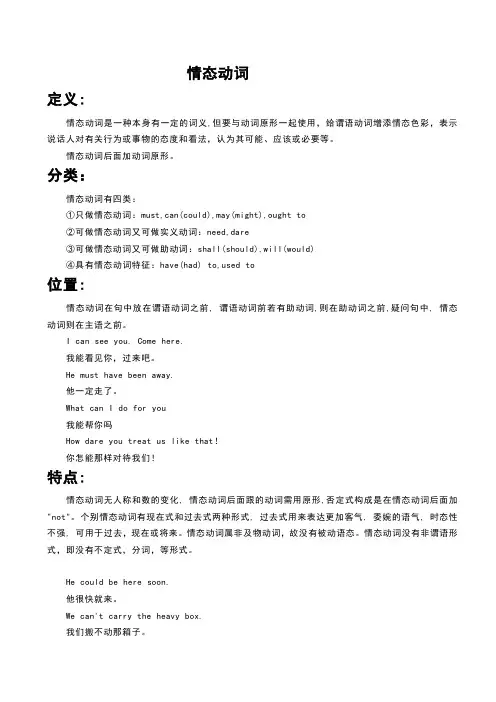
情态动词定义:情态动词是一种本身有一定的词义,但要与动词原形一起使用,给谓语动词增添情态色彩,表示说话人对有关行为或事物的态度和看法,认为其可能、应该或必要等。
情态动词后面加动词原形。
分类:情态动词有四类:①只做情态动词:must,can(could),may(might),ought to②可做情态动词又可做实义动词:need,dare③可做情态动词又可做助动词:shall(should),will(would)④具有情态动词特征:have(had) to,used to位置:情态动词在句中放在谓语动词之前, 谓语动词前若有助动词,则在助动词之前,疑问句中, 情态动词则在主语之前。
I can see you. Come here.我能看见你,过来吧。
He must have been away.他一定走了。
What can I do for you我能帮你吗How dare you treat us like that!你怎能那样对待我们!特点:情态动词无人称和数的变化, 情态动词后面跟的动词需用原形,否定式构成是在情态动词后面加"not"。
个别情态动词有现在式和过去式两种形式, 过去式用来表达更加客气, 委婉的语气, 时态性不强, 可用于过去,现在或将来。
情态动词属非及物动词,故没有被动语态。
情态动词没有非谓语形式,即没有不定式,分词,等形式。
He could be here soon.他很快就来。
We can't carry the heavy box.我们搬不动那箱子。
I'm sorry I can't help you.对不起,我帮不上你。
基本助动词与情态助动词最主要的区别之一是,基本助动词本身没有词义,而情态助动词则有自己的词义,能表示说话人对有关动作或状态的看法,或表示主观设想:What have you been doing since (构成完成进行体,本身无词义)I am afraid I must be going. (一定要)You may have read some account of the matter. (或许已经)除此之外,情态助动词还有如下词法和句法特征:1)除ought和used以外,其他情态动词后面只能接不带to的不定式。
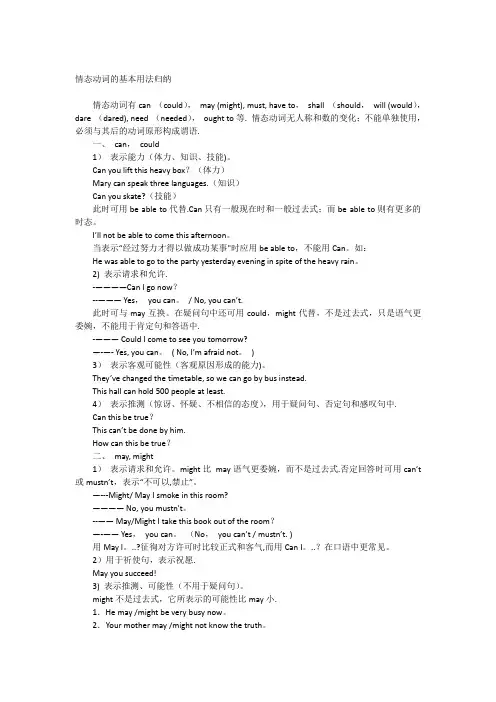
情态动词的基本用法归纳情态动词有can (could),may (might), must, have to,shall (should,will (would),dare (dared), need (needed),ought to等. 情态动词无人称和数的变化;不能单独使用,必须与其后的动词原形构成谓语.一、can,could1)表示能力(体力、知识、技能)。
Can you lift this heavy box?(体力)Mary can speak three languages.(知识)Can you skate?(技能)此时可用be able to代替.Can只有一般现在时和一般过去式;而be able to则有更多的时态。
I’ll not be able to come this afternoon。
当表示“经过努力才得以做成功某事"时应用be able to,不能用Can。
如:He was able to go to the party yesterday evening in spite of the heavy rain。
2) 表示请求和允许.-————Can I go now?--——— Yes,you can。
/ No, you can’t.此时可与may互换。
在疑问句中还可用could,might代替,不是过去式,只是语气更委婉,不能用于肯定句和答语中.-——— Could I come to see you tomorrow?—-—- Yes, you can。
( No, I’m afraid not。
)3)表示客观可能性(客观原因形成的能力)。
T hey’ve changed the timetable, so we can go by bus instead.This hall can hold 500 people at least.4)表示推测(惊讶、怀疑、不相信的态度),用于疑问句、否定句和感叹句中.Can this be true?This can’t be done by him.How can this be true?二、may, might1)表示请求和允许。
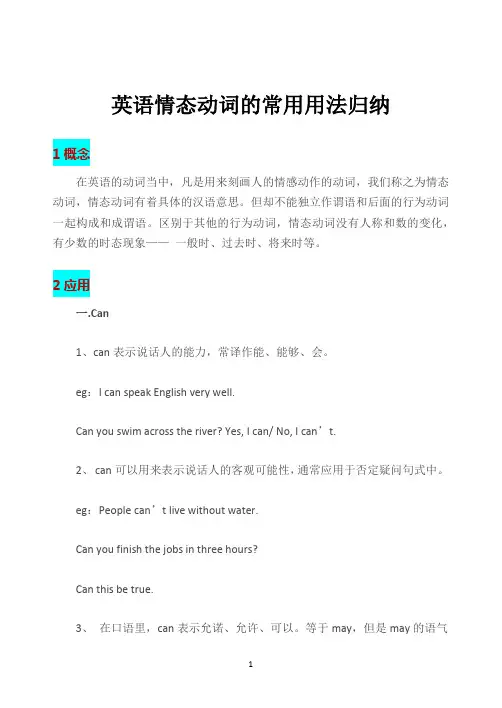
英语情态动词的常用用法归纳1概念在英语的动词当中,凡是用来刻画人的情感动作的动词,我们称之为情态动词,情态动词有着具体的汉语意思。
但却不能独立作谓语和后面的行为动词一起构成和成谓语。
区别于其他的行为动词,情态动词没有人称和数的变化,有少数的时态现象——一般时、过去时、将来时等。
2应用一.Can1、can表示说话人的能力,常译作能、能够、会。
eg:I can speak English very well.Can you swim across the river? Yes, I can/ No, I can’t.2、can可以用来表示说话人的客观可能性,通常应用于否定疑问句式中。
eg:People can’t live without water.Can you finish the jobs in three hours?Can this be true.3、在口语里,can表示允诺、允许、可以。
等于may,但是may的语气重于can。
eg:Can I come in? = May I come in?Can I use your bike? = May I use your bike ?*表示允许可以may mightcould can4、在“过去时”的语境里,通常用could 表示它的过去式,用be able to 短语(was/were)而could通常用来在一般现在时的语境里表示委婉语气eg:Could(can)you show me the way to the supermarket?5、can表示猜测(1)对现在状态的一种猜测,只能用在否定疑问句中。
eg:Zhang can’t be ill really?This can’t be done by him.(2)对现在动作的猜测eg: The boy can’t be telling lies.Mary works so hard, now, she can’t be sleeping.(3)对过去动作的一种猜测eg:He can’t have gone to the bookshop yesterday.Mother couldn’t have said it.6、can(could)惯用法(1)can’t wait to do 迫不及待做…….eg: Children can’t wait to eat apples in the basket.(2)can’t help doing 情不自禁做某事。
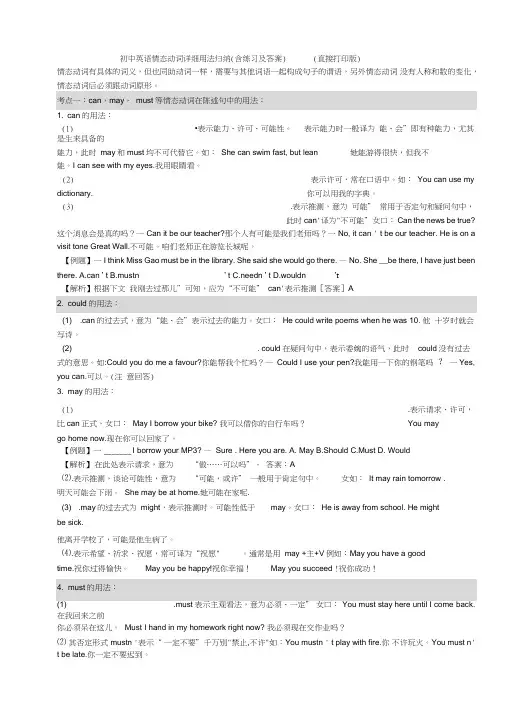
初中英语情态动词详细用法归纳(含练习及答案) (直接打印版)情态动词有具体的词义,但也同助动词一样,需要与其他词语一起构成句子的谓语,另外情态动词没有人称和数的变化,情态动词后必须跟动词原形。
1. can的用法:(1)•表示能力、许可、可能性。
表示能力时一般译为能、会”即有种能力,尤其是生来具备的能力,此时may和must均不可代替它。
如:She can swim fast, but lean 她能游得很快,但我不能。
I can see with my eyes.我用眼睛看。
(2)表示许可,常在口语中。
如:You can use my dictionary. 你可以用我的字典。
(3).表示推测,意为可能” 常用于否定句和疑问句中,此时can'译为"不可能”女口:Can the news be true?这个消息会是真的吗?一Can it be our teacher?那个人有可能是我们老师吗?一No, it can ' t be our teacher. He is on a visit tone Great Wall.不可能。
咱们老师正在游览长城呢。
【例题】一I think Miss Gao must be in the library. She said she would go there. —No. She __be there, I have just beenthere. A.can ' t B.mustn ' t C.needn ' t D.wouldn 't【解析】根据下文我刚去过那儿”可知,应为“不可能” can'表示推测[答案]A(1) .can的过去式,意为“能、会”表示过去的能力。
女口:He could write poems when he was 10. 他十岁时就会写诗。
(2) . could在疑问句中,表示委婉的语气,此时could没有过去式的意思。
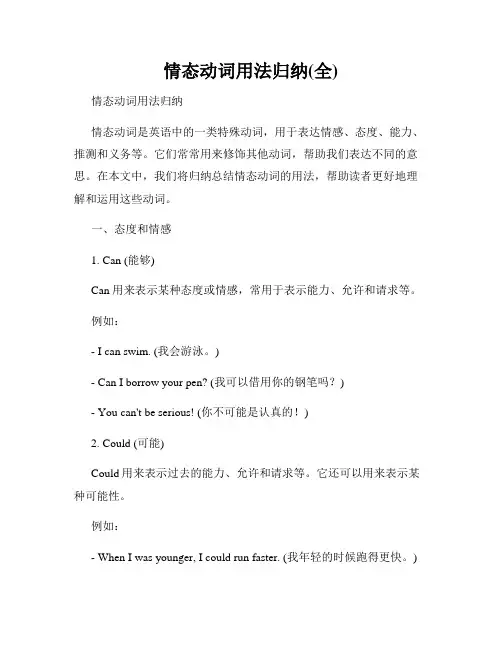
情态动词用法归纳(全)情态动词用法归纳情态动词是英语中的一类特殊动词,用于表达情感、态度、能力、推测和义务等。
它们常常用来修饰其他动词,帮助我们表达不同的意思。
在本文中,我们将归纳总结情态动词的用法,帮助读者更好地理解和运用这些动词。
一、态度和情感1. Can (能够)Can用来表示某种态度或情感,常用于表示能力、允许和请求等。
例如:- I can swim. (我会游泳。
)- Can I borrow your pen? (我可以借用你的钢笔吗?)- You can't be serious! (你不可能是认真的!)2. Could (可能)Could用来表示过去的能力、允许和请求等。
它还可以用来表示某种可能性。
例如:- When I was younger, I could run faster. (我年轻的时候跑得更快。
)- Could I ask you a question? (我可以问你一个问题吗?)- It could rain later, so bring an umbrella. (今天后面可能会下雨,所以带上雨伞。
)3. May (可能)May常表示许可、请求和推测等。
它还可以用来表示某种可能性或希望。
例如:- May I use your phone? (我可以用一下你的手机吗?)- It may rain tomorrow. (明天可能会下雨。
)- They may arrive late. (他们可能会迟到。
)4. Might (可能)Might与may的用法类似,但表示的可能性稍微低一些。
例如:- She might be busy. (她可能很忙。
)- I might go to the party, but I'm not sure yet. (我可能会去参加派对,但我还不确定。
)二、能力和推测1. Must (必须)Must用来表示强烈的推断或必要性。
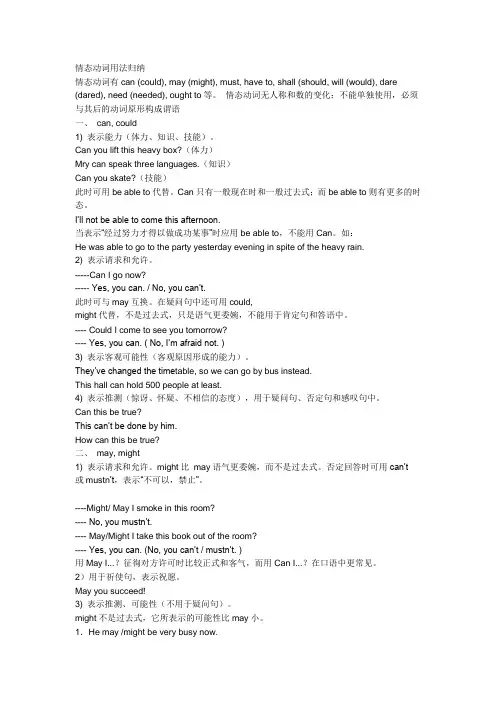
情态动词用法归纳情态动词有can (could), may (might), must, have to, shall (should, will (would), dare (dared), need (needed), ought to等。
情态动词无人称和数的变化;不能单独使用,必须与其后的动词原形构成谓语一、can, could1) 表示能力(体力、知识、技能)。
Can you lift this heavy box?(体力)Mry can speak three languages.(知识)Can you skate?(技能)此时可用be able to代替。
Can只有一般现在时和一般过去式;而be able to则有更多的时态。
I’ll not be able to come this afternoon.当表示“经过努力才得以做成功某事”时应用be able to,不能用Can。
如:He was able to go to the party yesterday evening in spite of the heavy rain.2) 表示请求和允许。
-----Can I go now?----- Yes, you can. / No, you can’t.此时可与may互换。
在疑问句中还可用could,might代替,不是过去式,只是语气更委婉,不能用于肯定句和答语中。
---- Could I come to see you tomorrow?---- Yes, you can. ( No, I’m afraid not. )3) 表示客观可能性(客观原因形成的能力)。
They’ve changed the time table, so we can go by bus instead.This hall can hold 500 people at least.4) 表示推测(惊讶、怀疑、不相信的态度),用于疑问句、否定句和感叹句中。

情态动词的用法归纳情态动词是一类帮助表达情态、态度、推测、建议和能力等含义的动词。
以下是情态动词的常见用法:1. 表示能力与能力推测:- can例句:I can swim.(我会游泳。
)- could例句:He could swim when he was five.(他五岁时就会游泳了。
)2. 表示许可与禁止:- may例句:You may use my phone.(你可以用我的手机。
)- might例句:I might go to the party tonight.(我可能今晚去参加派对。
)- mustn't例句:You mustn't smoke here.(你不能在这里抽烟。
)3. 表示推测与推测的否定:- may例句:He may be late.(他可能会迟到。
)- might例句:It might rain later.(天后可能会下雨。
)- can't例句:They can't be at home.(他们不可能在家。
)4. 表示义务与责任:- must例句:We must finish our homework.(我们必须完成作业。
)- have to例句:I have to go to work early tomorrow.(我明天必须早点去上班。
)5. 表示愿望与建议:- should例句:You should exercise regularly.(你应该经常锻炼。
)- ought to例句:They ought to help others.(他们应该帮助别人。
)6. 表示推荐与要求:- would like例句:I would like to have a cup of tea.(我想要一杯茶。
)- need例句:You need to finish this report by tomorrow.(你需要在明天之前完成这份报告。
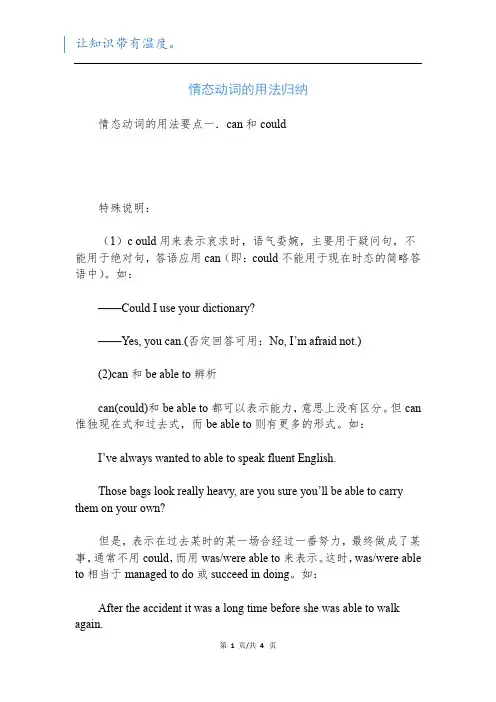
情态动词的用法归纳情态动词的用法要点一.can和could特殊说明:(1)c ould用来表示哀求时,语气委婉,主要用于疑问句,不能用于绝对句,答语应用can(即:could不能用于现在时态的简略答语中)。
如:——Could I use your dictionary?——Yes, you can.(否定回答可用:No, I’m afraid not.)(2)can和be able to辨析can(could)和be able to都可以表示能力,意思上没有区分。
但can 惟独现在式和过去式,而be able to则有更多的形式。
如:I’ve always wanted to able to speak fluent English.Those bags look really heavy, are you sure you’ll be able to carry them on your own?但是,表示在过去某时的某一场合经过一番努力,最终做成了某事,通常不用could,而用was/were able to来表示。
这时,was/were able to相当于managed to do或succeed in doing。
如:After the accident it was a long time before she was able to walk again.The fire was very big, but most people were able to escape from the building.(3) 惯用形式“cannot …too…”表示“无论怎么……也不(过分)”。
如:You cannot be too careful.你越当心越好。
惯用形式“cannot but+ 不定式(不带to)”表示“不得不,只好”。
如:I cannot but admire her determination.我不得不敬佩你的决心。

情态动词用法归纳总结情态动词(Modal Verbs)是用来表示说话人态度、意愿、能力、可能性、推测等语气的动词。
情态动词在句子中没有人称和数的变化,并且后面接动词原形。
下面是情态动词的用法归纳总结:1. Can-表示能力或许可,意为“能够,可以”-可以用于一般疑问句、否定句和陈述句-不能用于过去的能力或许可2. Could-表示过去的能力、可能性或请求,意为“能够,可以,可能”-可以用于一般疑问句、否定句和陈述句- Used to后面的动词原形(Used to do)表示过去的习惯,与could表示过去的能力有区别3. May-表示允许、可能性或请求,意为“可以,可能”-可以用于一般疑问句、否定句和陈述句4. Might-表示可能性或请求,意为“可能”-可以用于一般疑问句、否定句和陈述句5. Must-表示必须、推测或强烈的可能性,意为“必须,一定”-可以用于一般疑问句、否定句和陈述句6. Shall-表示将来的意愿或决定,意为“将,会”- 一般只用于第一人称(I和we)-可以用于一般疑问句、否定句和陈述句7. Should-表示应该、可能性或建议,意为“应该”-可以用于一般疑问句、否定句和陈述句8. Will-表示将来的意愿或决定,意为“将,会”-可以用于一般疑问句、否定句和陈述句9. Would-表示过去的习惯、虚拟语气或请求,意为“将,会,愿意”-可以用于一般疑问句、否定句和陈述句-用于主动语态时表示客气的请求或意愿,用于被动语态时表示过去的习惯10. ought to-表示应该,意为“应该”-用于一般疑问句、否定句和陈述句需要注意的是,情态动词后面的动词一般是不带to的原形形式。
有些情态动词的意思可能会根据上下文有所变化,所以具体使用时还需根据具体情况来判断。
初中英语情态动词用法归纳情态动词有具体的词义,但也同助动词一样,需要与其他词语一起构成句子的谓语,另外情态动词没有人称和数的变化,情态动词后必须跟动词原形。
考点一:can,may,must等情态动词在陈述句中的用法:1. can的用法:(1).表示能力、许可、可能性。
表示能力时一般译为“能、会”,即有种能力,尤其是生来具备的能力,此时may和must均不可代替它。
如:She can swim fast, but I can’t . 她能游得很快,但我不能。
I can see with my eyes.我用眼睛看。
(2).表示许可,常在口语中。
如:You can use my dictionary. 你可以用我的字典。
(3).表示推测,意为“可能”,常用于否定句和疑问句中,此时can’t译为“不可能”。
如:Can the news be true?这个消息会是真的吗?—Can it be our teacher?那个人有可能是我们老师吗?—No, it can’t be our teacher. He is on a visit to the Great Wall.不可能。
咱们老师正在游览长城呢。
【例题】—I think Miss Gao must be in the library. She said she would go there.—No. She __be there, I have just been there. A.can’t B.mustn’t C.needn’t D.wouldn’t【解析】根据下文“我刚去过那儿”可知,应为“不可能”,can’t表示推测[答案] A2. could的用法:(1).can的过去式,意为“能、会”,表示过去的能力。
如:He could write poems when he was 10. 他十岁时就会写诗。
(2). could在疑问句中,表示委婉的语气,此时could没有过去式的意思。
初中英语情态动词用法归纳情态动词有具体的词义,但也同助动词一样,需要与其他词语一起构成句子的谓语,另外情态动词没有人称和数的变化,情态动词后必须跟动词原形。
考点一:can,may,must等情态动词在陈述句中的用法:1. can的用法:(1).表示能力、许可、可能性。
表示能力时一般译为“能、会”,即有种能力,尤其是生来具备的能力,此时may和must均不可代替它。
如:She can swim fast, but I can’t . 她能游得很快,但我不能。
I can see with my eyes.我用眼睛看。
(2).表示许可,常在口语中。
如:You can use my dictionary. 你可以用我的字典。
(3).表示推测,意为“可能”,常用于否定句和疑问句中,此时can’t译为“不可能”。
如:Can the news be true?这个消息会是真的吗?—Can it be our teacher?那个人有可能是我们老师吗?—No, it can’t be our teacher. He is on a visit to the Great Wa ll.不可能。
咱们老师正在游览长城呢。
【例题】—I think Miss Gao must be in the library. She said she would go there.—No. She __be there, I have just been there. A.can’t B.mustn’t C.needn’t D.wouldn’t 【解析】根据下文“我刚去过那儿”可知,应为“不可能”,can’t表示推测[答案] A2. could的用法:(1).can的过去式,意为“能、会”,表示过去的能力。
如:He could write poems when he was 10. 他十岁时就会写诗。
(2). could在疑问句中,表示委婉的语气,此时could没有过去式的意思。
情态动词(Modal Verbs )* 情态动词也可称为“情态助动词(Modal Auxiliaries)”,因为它和基本助动词(be,do, have)都属于助动词类。
* 情态动词和其他动词连用,可表示说话人的语气。
* 情态动词可表达建议、要求、可能和意愿等。
* 情态动词没有人称和数的变化。
* 常用的情态动词有:can, could, may, might, must, shall, should, will, would这九大情态动词;其他的还有ought to, need, dare 等。
一、九大情态动词的时态关系:1. 现在式can -- 过去式could2. 现在式may -- 过去式might3. 现在式shall -- 过去式should4. 现在式will -- 过去式would5. 现在式must -- 过去式must (常用had to来代替)二、情态动词表示“可能”或“预测”(can, could, will, would, shall, should, must, ought to)(1)can 和could 用于表示“可能”或“预测”:1. He can't be at home. (否定句)他不可能在家。
2. Can the news be true ? (将情态动词can 置于主语the news 前就成疑问句)这消息可能是真的吗?3. Anybody can make mistake. (只表示理论上的可能性)任何人都可能犯错误。
(2)may 和might 用于表示“事实上的可能性”或“预测”:1. It may rain tomorrow. (表示可能会发生)明天可能会下雨。
2. It may snow later this afternoon. (表示预测)今天下午可能会下雪。
3. You might be right. (表示有可能)你可能是对的。
(3)will 和would 用于表示“预测”或“习惯性”:1. I think he will be all right now. (will be 表示一定会)我想他现在一定好了。
情态动词定义:情态动词是一种本身有一定的词义,但要与动词原形一起使用,给谓语动词增添情态色彩,表示说话人对有关行为或事物的态度和看法,认为其可能、应该或必要等。
情态动词后面加动词原形。
分类:情态动词有四类:①只做情态动词:must,can(could),may(might),ought to②可做情态动词又可做实义动词:need,dare③可做情态动词又可做助动词:shall(should),will(would)④具有情态动词特征:have(had) to,used to位置:情态动词在句中放在谓语动词之前, 谓语动词前若有助动词,则在助动词之前,疑问句中, 情态动词则在主语之前。
I can see you. Come here.我能看见你,过来吧。
He must have been away.他一定走了。
What can I do for you?我能帮你吗?How dare you treat us like that!你怎能那样对待我们!特点:情态动词无人称和数的变化, 情态动词后面跟的动词需用原形,否定式构成是在情态动词后面加"not"。
个别情态动词有现在式和过去式两种形式, 过去式用来表达更加客气, 委婉的语气, 时态性不强, 可用于过去,现在或将来。
情态动词属非及物动词,故没有被动语态。
情态动词没有非谓语形式,即没有不定式,分词,等形式。
He could be here soon.他很快就来。
We can't carry the heavy box.我们搬不动那箱子。
I'm sorry I can't help you.对不起,我帮不上你。
基本助动词与情态助动词最主要的区别之一是,基本助动词本身没有词义,而情态助动词则有自己的词义,能表示说话人对有关动作或状态的看法,或表示主观设想:What have you been doing since? (构成完成进行体,本身无词义)I am afraid I must be going. (一定要)You may have read some account of the matter. (或许已经)除此之外,情态助动词还有如下词法和句法特征:1)除ought和used以外,其他情态动词后面只能接不带to的不定式。
学习好资料欢迎下载情态动词的用法要点一. can 和 could情态动词用法例句1.“I don’tthink Mike can type. ”表示能力“Yes,he can”.2.Ican speak fluent English now,but I couldn’tlast year.在肯定句中,表示客观可能性,并不涉及具体某事会发生,常用来说明人或事物的特征。
要表达具体某事实际发生的可能性时,不用 can,需用 could, may, might 。
can/could表示请求和允许。
表示请求,口语中常用could 代替can,使语气更委婉。
表示对现在的动作或状态进行主观的猜测,主要用在否定句和疑问句中。
表示惊异、怀疑、不相信等态度,主要用在否定句、疑问句和感叹句中。
特别说明:1.As a human being, anyone can make a mistake.2.I ’m confident that a solution can be found.3.He can be very forgetful sometimes.4.I may stay at home this weekend(.实际可能性)5.Peter might come to join us(.实际可能性)6.It will be sunny in the daytime ,but it could rain tonight. (实际可能性 )1.Can we turn the air conditioner on?2.Any police officer can insist on seeing a driver’slicense. 3.In soccer,you can’ttouch the ball with your hands.4.Could you have her call me back when she gets home,please? 5.I wonder if I could just ask you to sign this.1.It can’tbe easy caring for a man and a child who are not your own.2.Can the man over there be our head master?1.Can this be an excuse for not giving them help?2.This can’tbe true.3.How can you be so crazy.( 1)could 用来表示请求时,语气委婉,主要用于疑问句,不能用于肯定句,答语应用can(即: could 不能用于现在时态的简略答语中)。
如:—— Could I use your dictionary?—— Yes, you can.(否定回答可用: No, I ’m afraid not.)(2)can 和 be able to 辨析can(could) 和 be able to 都可以表示能力,意思上没有区别。
但can 只有现在式和过去式,而be able to 则有更多的形式。
如:I ’ve always wanted to able to speak fluent English.Those bags look really heavy,are you sure you ’ll be able to carry them on your own?但是,表示在过去某时的某一场合经过一番努力,终于做成了某事,通常不用could,而用 was/were able to 来表示。
这时, was/were able to 相当于 managed to do 或 succeed in doing。
如:After the accident it was a long time before she was able to walk again.The fire was very big, but most people were able to escape from the building.(3)惯用形式“ cannot too”表示“无论怎么也不(过分)”。
如:You cannot be too careful. 你越小心越好。
惯用形式“ cannot but+ 不定式(不带to)”表示“不得不,只好”。
如:I cannot but admire her determination. 我不得不钦佩你的决心。
二. may 和 might情态动词用法例句表示允许、许可。
否定回答一般用 must not/mustn ’t,表示“禁止、阻止”之意,但也可以用had better not(最好别 )或 may not(不可以),语气较为委婉。
在表示请求、允许时,might 比 may 语气更委婉些。
用 May I 征询对方许可在文体上比较正式,在口气上比较客气,在日常用语中,用Can I征询对方意见更为常见。
表示可能性的推测,通常用在肯定句和否定句中,含有“或许”“大概”“可能”之意;用 might 代may/might替 may 时,则语气显得更加不肯定。
may 用于祈使句表示祝愿惯用句式:“ may well+ 动词原形”,意为“完全能,很可能”,相当于 to be very likely to“ may as well 或 might(just)as well+ 动词原形”意为“最好,满可以,倒不如” ,相当于“ had better或 there is no reason to do anything else. 1. May I come in and wait?2.—— May I smoke here?—— No, you mustn ’t(或 No, you ’d better not.) 1. Might I borrow your pen?2. I wonder if I might speak to your son.1. It may rain this afternoon.2. She might come to join us this afternoon.3. I suppose he might have missed the train.1. May you succeed.2. Long may he live!愿他能持续住下去。
3. May you have many more days as happy as this one. 4. May she rest in peace.愿她安息。
1. It may well change forever the way you look at Greek art.2. There may well be a real problem here.3. There is nothing to do, so I may as well go to bed. 4. You may as well tell us now, we ’ll find out sooner or later.5. I suppose we might as well go home.6. And if you have to plough the field anyway, you might as well plant it at the same time.二. must 和 have to情态动词用法表示“必须,应该”之意,语气比should, ought to强烈。
其否定形式 mustn’t表示“不准,不应该,禁止”等意在回答带有must 的问句时,否定回答常用needn’t must或 don’thave to,表示“不必” ,而不用mustn’t表示有把握的推测,意为“一定、准是、相必”,只例句1. You must come to school on time. 2. Everybody must obey the law.3. You mustn’tdrive so fast in the street. 4. We mustn’twaste any more time. 1.— Must I come back before ten?— Yes, you must.(No, youneedn ’t) 1. It must be my mother.have to have to 用于肯定句中“必须,不得不”,意义与 must 相近。
但 must 表示的是说话人的主观看法,而 have to 则往往强调客观需要。
must 只有一种形式,即现在式与过去式都是一种形式,而 have to 则涉及各种人称、时态等方面的变化形式。
两者的否定意义不同, mustn’t表示“禁止,不许” ,don’thave to 表示不必。
2. You must be hungry after a walk.3. There must be a hole in the wall.1. The film is not interesting. I really must go now.2. I have to go now, because my mother is in hospital.1.I had to work hard when I was your age.2.I will have to learn how to use a computer.3.In order to take the exam, we’ll have to finish thewhole book by the end of this month .1. You mustn’tgo there.2. You don’thave to go there.四. shall和 should情态动词用法shall用于第一、二、三人称构成的疑问句,表示征求对方意见或请求指示用于第二、三人称陈述句中,表示说话人给对方的命令、警告、允诺或威胁。
should表示劝告或建议,意为“应该”表示推测,用在肯定句中,对现在的情况或可能发生的事的主观推测或期待。
意为“想必,大概,或许”还可以用在if 引导的条件句中,表示一件事听起来可能性很小,但也不是完全不可能,相当于“万一”的意思。
从句谓语用should+ 动词原形构成,主句都一定用虚拟语气用于疑问句或感叹句中,表示意外、惊异的情绪,意为“竟会” ,与 why , what, how, who 连用,如果是疑问句,则不需要回答。